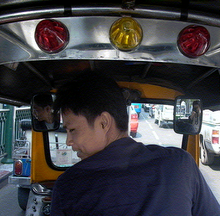The following may help define what specifically is being referred to in the recently passed,
controversial Indonesian law on CSR.
William Damon, a Professor of Education at Stanford University and a co-researcher of
Good Work Project, in his book “
The Moral Advantage” (2004), categorizes business morality into four dimensions:
"1. Generative morality arises from deep inner purposes and beliefs.
2. Emphatic morality is an approach to business relationships that reflects the Golden Rule principle of treating others as you yourself would like to be treated.
3. Restrictive morality is the widely shared societal code of ethics that protects people from trouble, regulates their behavior according to the traditional norms that society demands, guards their reputation, and provides them with safety from legal attack.
4. Philanthropic morality reflects a charitable impulse, donating a share of profits for altruistic ends." (p.49-50)
Although I haven’t finished reading the book (as usual I read several books simultaneously and end up finishing only a few), a recent conversation with a human right activist reminded me that, like all aspects of being human, not everything being labeled as philanthropic (and I would include the other three categories above) is good.
She was telling me about her experience as a volunteer in Aceh, and how international NGOs, in being critical of low wages in Indonesia (and other developing countries), ended up paying at least 9 million Rupiah (1000 USD) per month to Acehnese – thus raising their base salary at least ten times the norm prior to the tsunami. The immediate repercussion, according to this colleague, was social discrepancies and jealousy among the humanitarian volunteers and the local ‘humanitarian’ workers, who regardless of their qualifications get the priority for the many openings.
My fear is that among the long term, and perhaps worse, repercussions is the fact that when all these international NGOs have left the area, how would the local Acehnese sustain their current living standard? Besides, although I do think those working for NGOs should be professionally paid, such high financial incentives to work in post-disaster areas like Aceh and Yogyakarta have significantly blurred the line between humanism and opportunism.
Having said that, I don’t think all international NGOs have done more damages than goods, as many of the local NGOs are not all good either. Likewise with CSR. Although some companies have been accused of conducting CSR in order to buy off their guilt, there are many others who do so, if not – to borrow Damon’s term – for ‘generative’ reason, at least for ‘restrictive’, ‘philanthropic’, or ‘emphatic’ reasons.
The point of what I am trying to say is that although obviously there are many things to be improved by the CSR law, this should be seen as an opportunity to promote better business practices in Indonesia.




